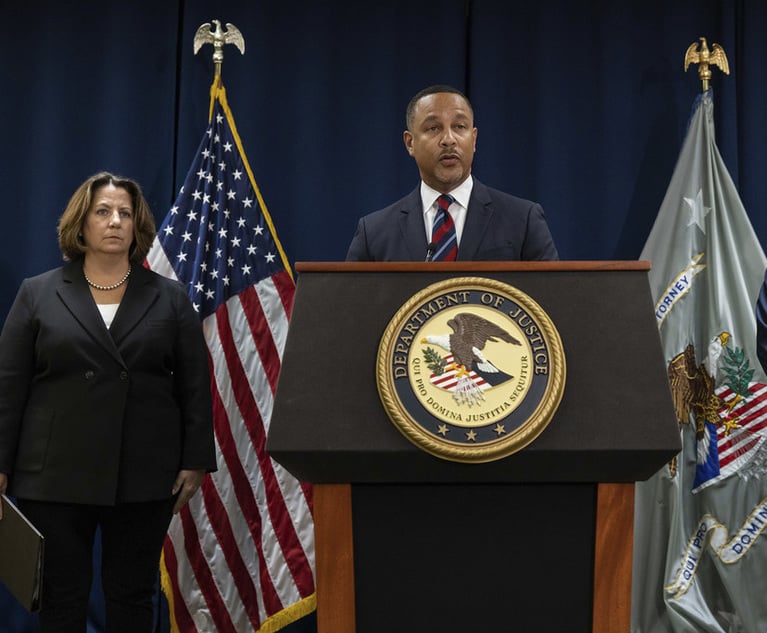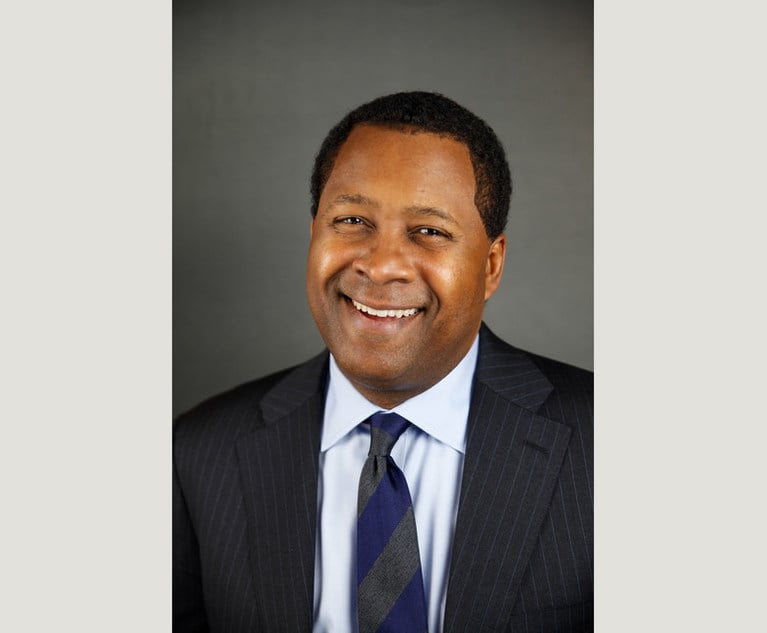Compliance Hot Spots: SG's Office Defends False Claims Act; Tech Lobbying; FTC's Facebook Divide; Lateral Moves; Who Got the Work
The US Justice Department is pushing back against claims the False Claims Act violates the Constitution's appointments clause. Plus: there's a new lobbying push on Capitol Hill involving "digital service taxes." Scroll down for Who Got the Work and an epic list of new hires and notable moves. Thanks for reading!
May 07, 2019 at 09:00 PM
11 minute read
Good evening from Washington—and welcome to Compliance Hot Spots, our roundup of news and analysis of regulatory and enforcement trends. Tips, feedback and general thoughts on your practices always appreciated. I'm your host, C. Ryan Barber. Reach me at [email protected] and 202-828-0315, or follow me on Twitter @cryanbarber.

A Constitutional Challenge to False Claims Act
In the U.S. Supreme Court, the Justice Department is defending the constitutionality of a federal law that allows whistleblowers to recoup fraudulent claims for payment on the government's behalf.
U.S. Solicitor General Noel Francisco has urged the justices to reject a challenge to the False Claims Act arising out of a whistleblower case alleging that Intermountain Healthcare, a Utah-based healthcare provider, improperly billed the government for unnecessary treatments.
Intermountain, represented by a team from McDermott Will & Emery, argued that the False Claims Act violates the Constitution's appointments clause by allowing whistleblowers—known under the law as “qui tam relators”—to bring civil cases prosecuting fraud against the U.S. government.
Francisco, joined on the brief by Assistant Attorney General Jody Hunt, and department lawyers Michael Raab and Sarah Carroll, contested the claim that the False Claims Act allows whistleblowers to effectively take on the role of government officials.
“A qui tam relator is more aptly analogized, not to a Justice Department attorney who  represents the United States in litigation, but to a plaintiff who asserts a private right of action under a federal statute. Congress's decision to authorize private lawsuits may often rest in part on its belief that such actions will vindicate a societal interest in deterring and remedying violations of federal law,” the solicitor general (at right) argued in a brief in opposition to certiorari.
represents the United States in litigation, but to a plaintiff who asserts a private right of action under a federal statute. Congress's decision to authorize private lawsuits may often rest in part on its belief that such actions will vindicate a societal interest in deterring and remedying violations of federal law,” the solicitor general (at right) argued in a brief in opposition to certiorari.
“As with plaintiffs who sue under other federal statutes, the potential for qui tam relators to furnish practical assistance in the enforcement of federal law does not transform them into 'officers of the United States' whose selection is governed by the Appointments Clause.”
Francisco pointed also to the authority the Justice Department has in False Claims Act cases, even after passing on the chance to intervene in them. For instance, the Justice Department can move to dismiss or settle cases over the objections of whistleblowers, and it can overrule a whistleblower's proposed settlement or dismissal of a False Claims Act case.
Elsewhere in the department, civil division lawyers are more aggressively asserting their authority to dismiss False Claims Act cases.
Under the Trump administration, the Justice Department issued guidance urging prosecutors to step in and move to dismiss whistleblower cases deemed to be meritless. In December alone, the Justice Department moved to dismiss 11 whistleblower lawsuits against drugmakers. But a top Justice Department official said in March that dismissal “will remain the exception, not the rule” in the government's approach to whistleblower cases.
McDermott's M. Miller Baker, co-chair of the firm's appellate group, is counsel of record for Intermountain Health Care. McDermott represents the company with a team from Polsinelli PC.
“This court should decide Intermountain's Appointments Clause challenge to the FCA, which presents an issue this court expressly reserved in Vermont Agency,” Baker wrote in Intermountain's petition. He pointed to a statement made by the late Justice Antonin Scalia in that 2000 case: “In so concluding, we express no view on the question whether qui tam suits violate Article II, in particular the Appointments Clause of § 2 and the 'take Care' Clause of § 3.”
Baker wrote: “Indeed, the answer to the unresolved question in Vermont Agency is that the FCA's qui tam provisions violate the Appointments Clause because (1) relators are officers; or, alternatively, (2) the FCA impermissibly vests a core function of officers—civil law enforcement—in nonofficer relators.”

Who Got the Work
>> Baker McKenzie partner Joshua Odintz in Washington has registered to lobby for a host of tech companies—including Twitter, Amazon, Facebook and Google—on “issues relating to digital service taxes.” Odintz, a former tax counsel at the Senate Finance Committee, serves on the management committee of Baker McKenzie's North American tax practice group. My colleague Cheryl Miller has more here.
>> A team from Kelley Drye & Warren has registered to lobby for Verizon Communications on “issues related to Net Neutrality legislation; issues related to infrastructure/broadband deployment; issues related to privacy legislation.” The lobbyists include Paul Rosenthal and Dana Wood, the co-leaders of the firm's government relations and public policy group.
>> Venable LLP has registered to lobby for Privacy for America, a “coalition in support of comprehensive federal consumer data privacy and security legislation.” The registration noted “internet, marketing, and data protection issues, including potential comprehensive federal consumer data privacy and security legislation.”
>> Akin Gump Strauss Hauer & Feld partner Estela Díaz represented GT Advanced Technologies Inc. as the company resolved claims that it misled investors about its ability to supply “sapphire glass” for Apple iPhones. The Securities and Exchange Commission accused the company of also misclassifying more than $300 million in debt to Apple that resulted from its repeated failures to meet performance milestones. GT Advanced agreed to cease and desist from further violations and its former CEO, Thomas Gutierrez, agreed to pay $140,000. Gutierrez was represented by Morgan, Lewis & Bockius partner Jordan Hershman, who leads the firm's securities litigation team.

Compliance Headlines That I'm Reading
>> FTC Wants to Punish Facebook, but the Divided Agency May Go Only So Far. “The F.T.C.'s five commissioners agreed months ago that they wanted to pursue a historic penalty that would show the agency's teeth. But now, the members are split on the size and scope of the tech company's punishment, according to three people with knowledge of the talks who spoke on the condition of anonymity. The division is complicating the final days of the talks.” FTC Chairman Joe Simons (above) wants to avoid a 3-2 vote on party lines. “The stakes are enormous for the agency and Mr. Simons. The case is being closely watched globally as a litmus test on how the United States government will police the country's tech giants.” [NYT] Politico has more here.
>> OFAC Speaks Loudly, Carries a Bigger Stick. “After an unusually quiet year bringing enforcement cases in 2018, the U.S. Department of the Treasury's Office of Foreign Assets Control (“OFAC”) has assumed an unprecedented pace in 2019—since January 31, OFAC has announced 14 settlements for violations of U.S. sanctions laws, an average of one per week.” [Dechert]
 >> Treasury Sets Expectations for Sanctions Compliance Programs. “The framework issued by the Treasury's Office of Foreign Assets Control on Thursday signals the agency wants companies to have an active sanctions compliance program, rather than a written policy alone, as the U.S. sanctions program becomes more dynamic and complex.” [The Wall Street Journal]
>> Treasury Sets Expectations for Sanctions Compliance Programs. “The framework issued by the Treasury's Office of Foreign Assets Control on Thursday signals the agency wants companies to have an active sanctions compliance program, rather than a written policy alone, as the U.S. sanctions program becomes more dynamic and complex.” [The Wall Street Journal]
>> Washington's Biggest Lobbyist, the U.S. Chamber of Commerce, Gets Shut Out. “After eight years tussling with the Obama administration, the chamber hoped a business-friendly administration would help reanimate its power. But Mr. Trump's populism has refashioned the GOP agenda, and that has cut against priorities of various chamber constituencies that oppose tariffs and view immigration as a useful labor supply.” [The Wall Street Journal]
>> Driverless Car Industry Luring Federal Safety Brass. “Companies like Uber, Lyft, General Motors and Google's sibling Waymo have hired a phalanx of current and former Washington officials, including Obama administration Transportation Secretary Anthony Foxx, several DOT highway regulators and two former chairs of the National Transportation Safety Board, the federal agency that investigates deadly crashes.” [Politico]
>> Consumer Bureau Moves to Cap Debt Collectors' Calls, and Allow Texts and Emails. “A set of proposed rules, released on Tuesday by the Consumer Financial Protection Bureau, is the latest step in a yearslong process to revise federal debt-collection rules that have not been significantly altered for more than four decades. The new rules would bar collectors from making more than seven phone calls a week to a debtor. Once they make contact, collectors would have to wait a week before calling again.” [NYT]
>> Who Is the Lawyer Pre-Reading Elon Musk's Tweets? ”Elon Musk's latest agreement with the U.S. Securities and Exchange Commission requires the chief executive officer get pre-approval from securities counsel before tweeting about Tesla Inc. finances, but it's not yet clear who that lawyer is or if he or she has been selected,” my colleague Caroline Spiezio writes. [Law.com]
>> Judge Green-Lights NY Suit Against Federal Agency Over Fintech Charters. The New York Department of Financial Services is suing the Office of the Comptroller of the Currency over a decision to essentially label fintech companies as banks, saying it will diminish its power to regulate the activities of those entities, my colleague Dan M. Clark reports. [New York Law Journal]
>> Senators Shaping Federal Privacy Law Get Input From Irish GDPR Regulator. Members of the Committee on Commerce, Science and Transportation raised their concerns with data privacy regulation on a federal level with witness Helen Dixon, the Irish data protection commissioner, whose agency oversees GDPR compliance for Facebook, Twitter, Uber and other U.S. tech companies incorporated in Ireland. [Corporate Counsel]

Notable Moves & Announcements
• Hogan Lovells has added longtime federal prosecutor and former Securities and Exchange Commission enforcement division lawyer Ann Kim to its litigation department, focusing on securities. “We have been strategically expanding our practice,” Los Angeles managing partner Michael Maddigan said in a statement.
• Greg Andres, who'd served on the Robert Mueller special counsel team, has returned to Davis Polk & Wardwell.
• The IRS has appointed Monte Jackel as special counsel to Michael Desmond, the agency's chief counsel. Jackel was formerly a senior tax counsel at Akin Gump Strauss Hauer & Feld.
 • Arnold & Porter has hired Charles Yi (at left) in Washington as a partner in the firm's financial services and legislative and public policy practices. Yi served as general counsel to the Federal Deposit Insurance Corporation from 2015-2019.
• Arnold & Porter has hired Charles Yi (at left) in Washington as a partner in the firm's financial services and legislative and public policy practices. Yi served as general counsel to the Federal Deposit Insurance Corporation from 2015-2019.
• Proskauer Rose is building out its litigation bench in New York with the addition of former federal prosecutor Seetha Ramachandran. Ramachandran joins Proskauer from Schulte Roth & Zabel, which she joined in 2014 after nearly a decade in public service.
• Jones Day has hired David Applebaum, former head of investigations at the Federal Energy Regulatory Commission, as a partner in Washington.
• Manatt, Phelps & Phillips has added Robert Garretson as a managing director in the firm's government and regulatory group in Washington. Garretson joins from U.S. Steel Corporation, where he had been general manager of governance strategy with the legal and compliance team.
• Locke Lord has hired Brian Devine as a white-collar and investigations partner in the firm's Boston office. Devine joins the firm from Goodwin Procter, where he was a partner focusing on securities litigation.
 • Leanne Geale (at left), chief ethics and compliance officer at Royal Dutch Shell, is joining Nestlé to serve as the Swiss company's executive vice president and general counsel. Geale begins her new role Aug. 1 and will oversee the company's legal and compliance functions.
• Leanne Geale (at left), chief ethics and compliance officer at Royal Dutch Shell, is joining Nestlé to serve as the Swiss company's executive vice president and general counsel. Geale begins her new role Aug. 1 and will oversee the company's legal and compliance functions.
• Boeing has announced that Brett Gerry, president of Boeing Japan, will be the company's new general counsel. Gerry succeeds J. Michael Luttig, who will stay with the company in a new role as counselor and senior adviser to CEO Dennis Muilenburg.
• Two lawyers who worked in General Electric's legal department to address compliance risks have started their own boutique in New York. Patricia O'Prey and Grace Wen said their new firm, O'Prey Wen, will focus on internal investigations, litigation and compliance services. Wen most recently practiced at Binder & Schwartz. O'Prey recently worked at the power generation company ContourGlobal plc.
• After 20 years of working behind the scenes in government, John Abegg, chief counsel to U.S. Senate Majority Leader Mitch McConnell, has joined the U.S. Chamber Institute for Legal Reform. Abegg will become executive vice president of the institute on May 13, replacing Harold Kim, who was promoted to chief operating officer.
This content has been archived. It is available through our partners, LexisNexis® and Bloomberg Law.
To view this content, please continue to their sites.
Not a Lexis Subscriber?
Subscribe Now
Not a Bloomberg Law Subscriber?
Subscribe Now
NOT FOR REPRINT
© 2025 ALM Global, LLC, All Rights Reserved. Request academic re-use from www.copyright.com. All other uses, submit a request to [email protected]. For more information visit Asset & Logo Licensing.
You Might Like
View All
Compliance Hot Spots: GOP Eyes ESG as an Antitrust Issue + Another DOJ Crypto Seizure + Sidley Partner Jumps to Main Justice
9 minute read
Compliance Hot Spots: Lessons from Lafarge + Fraud Section Chief Talks Compliance + Cravath Lands FTC Commissioner
11 minute readTrending Stories
- 1Rejuvenation of a Sharp Employer Non-Compete Tool: Delaware Supreme Court Reinvigorates the Employee Choice Doctrine
- 2Mastering Litigation in New York’s Commercial Division Part V, Leave It to the Experts: Expert Discovery in the New York Commercial Division
- 3GOP-Led SEC Tightens Control Over Enforcement Investigations, Lawyers Say
- 4Transgender Care Fight Targets More Adults as Georgia, Other States Weigh Laws
- 5Roundup Special Master's Report Recommends Lead Counsel Get $0 in Common Benefit Fees
Who Got The Work
J. Brugh Lower of Gibbons has entered an appearance for industrial equipment supplier Devco Corporation in a pending trademark infringement lawsuit. The suit, accusing the defendant of selling knock-off Graco products, was filed Dec. 18 in New Jersey District Court by Rivkin Radler on behalf of Graco Inc. and Graco Minnesota. The case, assigned to U.S. District Judge Zahid N. Quraishi, is 3:24-cv-11294, Graco Inc. et al v. Devco Corporation.
Who Got The Work
Rebecca Maller-Stein and Kent A. Yalowitz of Arnold & Porter Kaye Scholer have entered their appearances for Hanaco Venture Capital and its executives, Lior Prosor and David Frankel, in a pending securities lawsuit. The action, filed on Dec. 24 in New York Southern District Court by Zell, Aron & Co. on behalf of Goldeneye Advisors, accuses the defendants of negligently and fraudulently managing the plaintiff's $1 million investment. The case, assigned to U.S. District Judge Vernon S. Broderick, is 1:24-cv-09918, Goldeneye Advisors, LLC v. Hanaco Venture Capital, Ltd. et al.
Who Got The Work
Attorneys from A&O Shearman has stepped in as defense counsel for Toronto-Dominion Bank and other defendants in a pending securities class action. The suit, filed Dec. 11 in New York Southern District Court by Bleichmar Fonti & Auld, accuses the defendants of concealing the bank's 'pervasive' deficiencies in regards to its compliance with the Bank Secrecy Act and the quality of its anti-money laundering controls. The case, assigned to U.S. District Judge Arun Subramanian, is 1:24-cv-09445, Gonzalez v. The Toronto-Dominion Bank et al.
Who Got The Work
Crown Castle International, a Pennsylvania company providing shared communications infrastructure, has turned to Luke D. Wolf of Gordon Rees Scully Mansukhani to fend off a pending breach-of-contract lawsuit. The court action, filed Nov. 25 in Michigan Eastern District Court by Hooper Hathaway PC on behalf of The Town Residences LLC, accuses Crown Castle of failing to transfer approximately $30,000 in utility payments from T-Mobile in breach of a roof-top lease and assignment agreement. The case, assigned to U.S. District Judge Susan K. Declercq, is 2:24-cv-13131, The Town Residences LLC v. T-Mobile US, Inc. et al.
Who Got The Work
Wilfred P. Coronato and Daniel M. Schwartz of McCarter & English have stepped in as defense counsel to Electrolux Home Products Inc. in a pending product liability lawsuit. The court action, filed Nov. 26 in New York Eastern District Court by Poulos Lopiccolo PC and Nagel Rice LLP on behalf of David Stern, alleges that the defendant's refrigerators’ drawers and shelving repeatedly break and fall apart within months after purchase. The case, assigned to U.S. District Judge Joan M. Azrack, is 2:24-cv-08204, Stern v. Electrolux Home Products, Inc.
Featured Firms
Law Offices of Gary Martin Hays & Associates, P.C.
(470) 294-1674
Law Offices of Mark E. Salomone
(857) 444-6468
Smith & Hassler
(713) 739-1250










